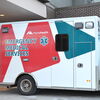Senate passes spending bill, here's how it impacts Maine
 Courtesy / U.S. Naval War College, Flickr
Sen. Angus King, I-Maine, reports on how the omnibus spending bill approved by the Senate on Thursday will impact Maine.
Courtesy / U.S. Naval War College, Flickr
Sen. Angus King, I-Maine, reports on how the omnibus spending bill approved by the Senate on Thursday will impact Maine.
U.S. Sen. Angus King, I-Maine, a member of the Senate Budget Committee, reported that the Fiscal Year 2018 Omnibus Federal Appropriations bill approved by the Senate Thursday, which funds the government through Sept. 30, 2018, includes funding for several priorities he’s advocated for that benefit Maine.
“Despite my frustration with the budget process over the last few months, the bill passed today funds important programs and initiatives that support hard-working men and women in Maine,” King said in a news release. “From funding critical resources to combat the opioid epidemic, to supporting shipbuilding priorities at Bath Iron Works, to streamlining veterans’ services, to expanding rural broadband infrastructure, this legislation will help support the good work of people across Maine who are dedicated to strengthening the economy and improving the lives of others in their communities.
Here are provisions included in the bill that King said are important for Maine:
Opioids and mental health: Funding to fight the opioids and mental health crises increases by $3.3 billion, including an increase of $2.8 billion in treatment, prevention and research for programs within the Department of Health and Human Services. Last month, King wrote to the Senate Appropriations Committee urging the committee to prioritize funding in the omnibus for states with high opioid overdose mortality rates, and to also ensure that this funding was set aside for tribes. Both of these stipulations were included in the omnibus.
Shipbuilding priorities: $3.4 billion in funding for the DDG-51 destroyer program that Bath Iron Works can compete to build, as well as almost $217 million for the continued R&D and production of DDG-1000 Zumwalt-class destroyers, all of which are being built at Bath. The bill also adds $150 million for advance procurement of new Polar-class icebreaker for the Coast Guard in FY18. As co-chair of the Arctic Caucus, King has been a vocal supporter of increasing the amount of resources devoted to polar icebreakers.
Broadband expansion: $600 million to establish a USDA rural broadband grant-loan pilot program that mirrors the B-CROP Act, legislation King cosponsored in August 2017.
Election security: $380 million in funding for election technology grants to help states secure election systems and voting infrastructure. The states may use this funding for items to protect voter registration files and elections results reporting systems, in addition to any automated tabulation machines or software that may need to be updated. King has repeatedly warned that Russia’s interference in the integrity of the 2016 election is deeply troubling and that the country needs to include election integrity in a comprehensive cyber strategy.
Pay raise for service members: The legislation fully funds a 2.4% pay increase for service members and a 1.9% increase for civilian employees.
Veterans issues: $500 million increase above last year’s funding levels at the Department of Veterans Affairs for mental health care programs. This includes a 16% increase over last year’s levels for opioid treatment and prevention programs and $186 million in funding specifically for suicide prevention. Last year, King advocated for, and helped secure three new VA positions in Maine, including a specialist focused on veteran suicide prevention.
Child care and working families: $2.37 billion for the Child Care and Development Block Grant program, which aims to improve child care quality for low-income households. This funding marks a more than 80% increase from last year’s funding, the largest single-year increase in the program’s history.
Low-incoming housing: Expands availability of the low-income housing tax credit program for the next four years, resulting in an estimated additional 35,000 affordable housing units. The omnibus also provides new housing vouchers for non-elderly disabled individuals, veterans and youth foster care, for a combined investment of more than $42 billion. The bill also increases funding for the LIHEAP program and Weatherization Assistance Program, which both help low-income families and people living on fixed incomes — like many Maine seniors — get through the winter and pay their energy bills.
Workforce development: The bill includes a $15 million increase in funding for Job Corps, up to $1.72 billion. The administration had proposed a $407 million cut for Fiscal Year 2019 and last year proposed across-the-board cuts to enrollment at Job Corps centers. King joined a letter to the Department of Labor raising concerns about the rationale for the enrollment cuts, which have since been withdrawn. The Loring Jobs Corps Center in Limestone and the Penobscot Job Corps Center in Bangor provide disadvantaged youth with the skills needed to obtain and hold a job, enter the Armed Forces, or enroll in advanced training or higher education. Their work is particularly important given Maine's historically-low unemployment rate and the need to expand the state's workforce. http://www.maine.gov/labor/cwri/laus.html
CDC research on gun violence: The legislation clarifies the Dickey Amendment, which had previously been interpreted as a means to prevent gun violence research at the Centers for Disease Control. The omnibus includes new report guidance clarifying that, as the Secretary of HHS has testified, gun violence research at the CDC can move forward.
Strengthening background checks: The legislation includes the Fix NICS Act, a bipartisan bill cosponsored by King that incentivizes states and requires federal agencies to annually report their compliance in submitting all information to the background check system.
Ban on tip pooling: The bill includes language to prevent employers and managers from taking money from tip pooling arrangements at establishments that have a mix of tipped and non-tipped employees, such as restaurants and hotels. King recently sent a letter to the Department of Labor to raise concerns with proposed regulation that would allow employers to keep employees' tips for themselves. The Economic Policy Institute estimated that allowing the rule to go forward unamended could result in Maine workers losing up to $31.7 million per year in tips.
Environmental programs: The omnibus includes the bipartisan BUILD Act, legislation King cosponsored to assist states and local communities through grants and technical assistance as they assess, safely clean up, and reuse properties that contain a hazardous substance, pollutant, or contaminant for economic development projects. The bill also reauthorizes the EPA’s Brownfields program until 2023, and makes numerous improvements to provide states and local governments with additional tools and flexibility to effectively clean up these contaminated sites. The omnibus also increases funding for the Land and Water Conservation Fund, which has contributed to funding for Acadia National Park, the conservation of Maine’s vast forest lands for public use, and countless outdoor recreation projects.












Comments